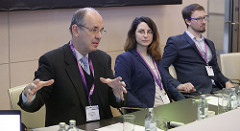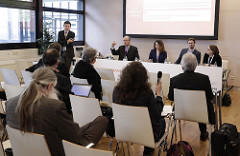The EU Commission initiates a pan-European solution for data-related issues of the future – Data Intelligence Offensive acts as Communication & Dissemination Lead.
Data sharing shapes the economic and societal future of Europe and bears huge potentials, but also comes with risks and apprehensions. The EU project TRUSTS – Trusted Secure Data Sharing Space was established to identify and overcome legal, ethical, and technical challenges of cross-border data markets.
Keeping ahead
For Europe to keep up with big tech and global supply chains in the AI age, a functioning European data economy is essential. European organisations and companies will need to adopt data-driven innovation and digital transformation to keep up with international competition and global supply chains, on the basis of European values such as personal rights and data protection legislation. The rules of competition law, intellectual property law as well as data protection and privacy law, regulate different important aspects of such a federated platform (e.g. platform regulation, standardisation and interoperability under proprietary models of ownership, data ownership, etc.). Keeping this competitive advantage resides in the ability to operate cross-border in Europe. Partners of the project are located in Austria, Belgium, Cyprus, Germany, Greece, Israel, the Netherlands, Romania, and Spain.
According to Alexandra Garatzogianni, TRUSTS Project Coordinator (Leibniz University of Hannover) and Head of Knowledge and Technology Transfer (TIB), “the H2020 TRUSTS project addresses a vast spectrum of challenges across the entire data value chain, ranging from the lack of trusted platforms and privacy-aware analytics methods for secure sharing of personal data to diverging technical and legal standards, which hamper the growth of the data economy. We thus aim to ensure the sustainable business uptake of secure data markets by enabling a fully operational and GDPR-compliant European Data Marketplace for personal and industrial data in the finance and telecom sectors, while allowing the integration and adoption of future platforms”.
Reference architecture
The project will incorporate several future technologies. For example, the TRUSTS European Data Market will be based on the reference architecture designed by the International Data Spaces (IDS) Association, (https://www.internationaldataspaces.org). The IDS architecture is considered the de facto standard for creating and operating data ecosystems. Its approach is to enable interoperability through semantic data descriptions, to create trust between participants through certified security functions, and to establish governance rules for data usage and data flows. The IDS architecture ensures data sovereignty for those who make data available in data ecosystems.
Upholding European values such as privacy and data protection
All developments within the project are accompanied by legal and ethical considerations tat ensure the results are compliant with current and forthcoming regulatory frameworks. A main result will be a set of requirements for compliance of the technological solution developed, recommendations for policy makers and stakeholders in the field.
Charlotte Ducuing, PhD fellow researcher at Katholieke Universiteit Leuven (KU Leuven), TRUSTS Legal and Ethical Partner, notes: “Data commodification disrupts existing legal frameworks. Therefore, we need to collectively think about how the law should interact with data markets, from enabling them to thrive to channelling them in a way that serves the public purpose.”
Three use cases from anti-money laundering to marketing
In an age in which technologies are developing at rapid speed, the corresponding framework conditions must first be implemented – this is where the TRUSTS consortium sees its task. Within the TRUSTS project, the current challenges are identified and tested in realistic scenarios. TRUSTS brings together technology providers that are already deeply involved in two existing major national data market projects (Data Market Austria and International Data Spaces) to create a European Data Market based on secure and trustworthy data exchanges. This integration will be tested in practice by six companies, addressing three use cases in the financial and telecommunications sector: Anti-Money Laundering Compliance, Agile Marketing through Data Correlation, and Improved Customer Support Services by Data Acquisition. The TRUSTS technology and use cases will be constantly accompanied by business considerations, which will ensure that the results of the project are sustainable beyond the duration of the funding.
Funding
The 7 mio. EUR project has received funding from the European Union’s Horizon 2020 research and innovation programme under grant agreement No 871481.
For more information visit: https://trusts-data.eu



 Nachdem sich das Projektende in Riesenschritten nähert, finden auch unsere Konsortiums-Treffen in kürzeren Zeitabständen statt. Am 12. Februar 2019 trafen sich die ProjektpartnerInnen erneut in Wien, diesmal bei unserem Projektpartner
Nachdem sich das Projektende in Riesenschritten nähert, finden auch unsere Konsortiums-Treffen in kürzeren Zeitabständen statt. Am 12. Februar 2019 trafen sich die ProjektpartnerInnen erneut in Wien, diesmal bei unserem Projektpartner 

 Der »Medical Data Space« (MedDS) ist ein virtueller Datenraum, der den sicheren Austausch und die einfache Verknüpfung von medizin- und gesundheitsbezogenen Daten aus unterschiedlichen Quellen auf Basis von Standards und mithilfe gemeinschaftlicher Governance-Modelle unterstützt, mit dem Ziel der Steigerung von Diagnose-, Vorsorge- und Behandlungsqualität sowie eines verbesserten Therapiemonitoring. Der MedDS wahrt die digitale Souveränität der Dateneigentümer (Patient, Klinik, Arzt, Pharmazie-Unternehmen etc.) und bildet zugleich die Basis für Forschung und Entwicklung, personalisierte Therapien, Prozess- und Kostenoptimierung sowie innovative Geschäftsmodelle.
Der »Medical Data Space« (MedDS) ist ein virtueller Datenraum, der den sicheren Austausch und die einfache Verknüpfung von medizin- und gesundheitsbezogenen Daten aus unterschiedlichen Quellen auf Basis von Standards und mithilfe gemeinschaftlicher Governance-Modelle unterstützt, mit dem Ziel der Steigerung von Diagnose-, Vorsorge- und Behandlungsqualität sowie eines verbesserten Therapiemonitoring. Der MedDS wahrt die digitale Souveränität der Dateneigentümer (Patient, Klinik, Arzt, Pharmazie-Unternehmen etc.) und bildet zugleich die Basis für Forschung und Entwicklung, personalisierte Therapien, Prozess- und Kostenoptimierung sowie innovative Geschäftsmodelle.